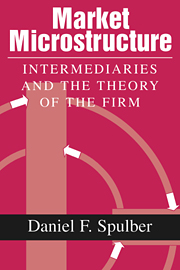The Theory of the Firm
Microeconomics with Endogenous Entrepreneurs, Firms, Markets, and Organizations
- Author: Daniel F. Spulber, Northwestern University, Illinois
- Date Published: April 2009
- availability: Available
- format: Hardback
- isbn: 9780521517386
Hardback
Other available formats:
eBook
Looking for an inspection copy?
This title is not currently available for inspection. However, if you are interested in the title for your course we can consider offering an inspection copy. To register your interest please contact [email protected] providing details of the course you are teaching.
-
The Theory of the Firm presents a path-breaking general framework for understanding the economics of the firm. The book addresses why firms exist, how firms are established, and what contributions firms make to the economy. The book presents a new theoretical analysis of the foundations of microeconomics that makes institutions endogenous. Entrepreneurs play a central economic role by establishing firms. In turn, firms create and operate markets and organizations. The book provides innovative models of economic equilibrium that endogenously determine the structure and function of economic institutions. The book proposes an 'intermediation hypothesis' - the establishment of firms depends on the effects of transaction costs and on the extent of the market.
Read more- Innovative theory argues that firms create markets, not vice versa, with important role given to transaction costs
- Author is one of the US's leading practitioners of industrial organization theory, and known worldwide
- Book has been tested out in the classroom and the journals, but will still be controversial
Reviews & endorsements
'Daniel Spulber has produced nothing less than a magisterial work. His treatment of firm formation and the role of entrepreneurs in economic activity makes it a certainty that introductory texts in economics will have to be rewritten to accommodate the importance of his work and insight. For the first time, Schumpeter's work has been expanded and settled within the context of modern economics such that the transformation of our economy toward entrepreneurial capitalism has a new and profoundly well-reasoned theoretical basis.' Carl J. Schramm, President, Ewing Marion Kauffman Foundation
See more reviews'To say that Daniel Spulber's The Theory of the Firm is encyclopedic of everything we know about the business firm would be to sell it short. It is vastly more than a compilation and explanation of the best of extant theory, though it is that; it is also a synthesis of all this information with a new structural approach to theory that will undoubtedly guide research for years to come. Out of this comprehensive treatise on the nature, functioning, and history of the business firm comes an entirely new way of looking at this enormously complex subject. This is a work of scale, scope, wisdom, integration, and analysis such as we rarely see in business scholarship. The business firm has found its Boswell, its Britannica, its Lamarck, and maybe its Einstein.' Henry G. Manne, Dean Emeritus, George Mason University School of Law
'In The Theory of the Firm, Dan Spulber achieves an astonishingly broad and deep contribution to economics that goes beyond the topic in the title. This path-breaking work is a required read for anyone truly interested in economics and finance.' Michael C. Jensen, Professor of Business Administration Emeritus, Harvard Business School
'Daniel Spulber has written an innovative and important book that takes seriously the creation of firms and other institutions by emphasizing the multiple roles of individuals as consumers, workers, and particularly entrepreneurs. Entrepreneurs create firms when they can reduce transactions costs that impede direct exchange between consumers and factor suppliers. In doing so, firms create and manage markets and organizations. The book introduces a series of separation theorems that help to explain the economic role of the firm. The book provides novel mathematical models that address the firm's economic contributions. I highly recommend the book to economists and others with an interest in economic institutions and the organization of economic activity.' David P. Baron, Professor of Political Economy and Strategy, Emeritus, Stanford University
'This important book revolutionizes our knowledge and understanding of entrepreneurship. Dan Spulber breaks important new ground in laying out a coherent and compelling theory of entrepreneurship that is sure to impact all scholars and policy makers focusing on entrepreneurship and innovation.' David B. Audretsch, Director, Max Planck Institute of Economics and Distinguished Professor, Indiana University
Customer reviews
Not yet reviewed
Be the first to review
Review was not posted due to profanity
×Product details
- Date Published: April 2009
- format: Hardback
- isbn: 9780521517386
- length: 544 pages
- dimensions: 254 x 183 x 33 mm
- weight: 1.11kg
- contains: 44 b/w illus. 5 tables
- availability: Available
Table of Contents
Introduction
Part I. The Theory of the Firm:
1. The consumer
2. The firm
3. Separation of consumer objectives and firm objectives
Part II. The Entrepreneur in Equilibrium:
4. The entrepreneur
5. Competition between entrepreneurs
Part III. Human Capital and Financial Capital:
6. Human capital and the organization of the firm
7. Financial capital and the organization of the firm
Part IV. Intermediation by the Firm:
8. The firm as intermediary in the pure exchange economy
9. The firm versus free riding
Part V. Market Making by the Firm:
10. The firm creates markets
11. The firm in the market for contracts
12. Conclusion.Instructors have used or reviewed this title for the following courses
- Agribusiness Entrepreneurship
- Business Basics for Lawyers
- Business Seminar
- Corporate Governance
- Corporations
- Current Issues in Global Economy
- Economics of Agribusiness Strategy and Marketing
- Economics of the Firm
- Environment of International Business
- Intermediate Price Theory
- Intro Entrepreneurship
- Introductory Microeconomics
- MBA Microeconomics
- Managerial Economics/Law and Economics
- Microeconomic Analysis 2
- The Theory of the Firm
- Topics in Microeconomics
Sorry, this resource is locked
Please register or sign in to request access. If you are having problems accessing these resources please email [email protected]
Register Sign in» Proceed
You are now leaving the Cambridge University Press website. Your eBook purchase and download will be completed by our partner www.ebooks.com. Please see the permission section of the www.ebooks.com catalogue page for details of the print & copy limits on our eBooks.
Continue ×Are you sure you want to delete your account?
This cannot be undone.
Thank you for your feedback which will help us improve our service.
If you requested a response, we will make sure to get back to you shortly.
×





